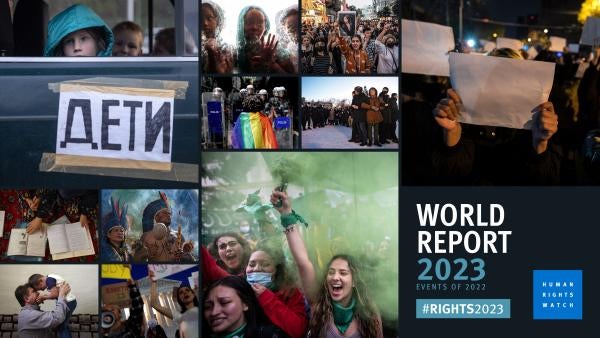War crimes, crimes against humanity, security forces shooting protesters, torture in police custody, authoritarian censorship, mass surveillance, state brutality against the most powerless…
How can you summarize a year of human rights abuses and incalculable suffering around the globe and find anything other than despair, let alone hope to humanity that things can be better?
This is the task Human Rights Watch faces every year, when we put together our annual World Report, and this year’s edition, published this morning, is no different.
The World Report is the result of a seemingly infinite number of staff hours over four or five months – intensive research, internal discussions, careful preparations – all with a simple two-pronged focus: to explain what happened last year and to highlight what we should learn from it.
For the former, we take it country by country. The World Report offers an overview of the human rights situation in more than 100 countries over the past 12 months. Just select a country from the list, and go…
The entry for Afghanistan, for example, details how the Taliban have continued to impose appalling restrictions on women and girls. The entry for the UK details how the government in 2022 adopted laws that violate fundamental rights. The entry for Nigeria highlights worsening insecurity as the country heads into general elections this year.
But to leave it at that – a kind of inventory of abuses – would not be enough. We aren’t here simply to document the world’s horrors. We are here to help change the world for the better.
To that end, the World Report also offers a thoughtful and powerful essay by our Acting Executive Director Tirana Hassan. As in previous years, when it was authored by our former chief, Ken Roth, the text is something of a group effort, reviewed by dozens of other experts and specialists, but it maintains a strong, singular voice.
Entitled, “A New Model for Global Leadership on Human Rights,” the essay brings all the threads together to weave a cloth of optimism, rooted in reality.
So, where is the hopeful lesson from 2022, you ask?
For one, as Tirana explains, shifting power balances in the world have opened up opportunities for new coalitions and new voices of leadership. “There is more space, not less, for governments to stand up and adopt rights-respecting plans of action.”
As one of her examples, she points out how Pacific Island nations as a bloc have been influential in pushing for more ambitious emissions reductions from countries polluting the most.
But perhaps the most important ray of light in 2022 came from one of the darkest places: Ukraine. Putin’s renewed invasion and war crimes spree appalled the world, but, as Tirana explains, in the global response to Russia’s terror, we see a new possibility of how things can be done better.
European countries that for years coldly claimed it was impossible for them to take in desperate people fleeing war, suddenly welcomed millions of Ukrainian refugees. Human rights activists knew it was possible all along. These governments have now proven we were right.
Russia’s brutal invasion has also activated the full global human rights system in unprecedented ways.
The UN Human Rights Council promptly opened an investigation to document and preserve evidence of human rights violations in the war. Later, they created a special rapporteur to monitor the human rights situation inside Russia, which has deteriorated rapidly since the renewed invasion.
The UN General Assembly four times condemned both Russia’s invasion and its human rights violations. The General Assembly also suspended Russia from the UN Human Rights Council, blunting Russia’s spoiler capacity on Ukraine and other serious human rights crises elsewhere.
The prosecutor of the International Criminal Court in The Hague opened a Ukraine investigation following a referral of the situation by an unprecedented number of the court’s member countries.
Governments have also mobilized to weaken Putin’s global influence and military power, imposing targeted international sanctions against Russian individuals, companies, and other entities.
Yes, it would be better if we could see this level of international action for other crises, too – Ethiopia’s war, for example. And yes, the global response to Ukraine, as impressive as it is, has not yet ended Russia’s atrocities. Still, there is something essential to learn from how governments have been actively addressing Russia’s brutal invasion.
As Tirana summarizes: “This extraordinary response showed what is possible for accountability, for refugee protection, and for safeguarding the human rights of some of the world’s most vulnerable people.”
And simply knowing the world can act when it wants to is hugely empowering.
Going forward into 2023 and beyond, our job will be to help forge that kind of political will elsewhere as well.
We’ve seen it can be done.



